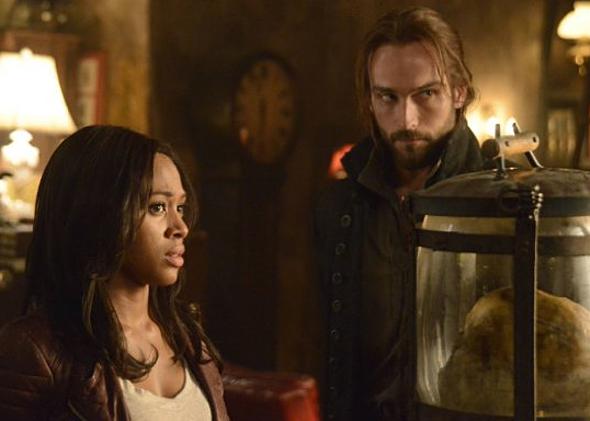Dear Willa, June and Jim,
Yay! Someone gave me an excuse to write about Sleepy Hollow—thank you, Willa! You know, I get what you said about being “preannoyed.” The pilot for Sleepy Hollow made me preafraid that it would descend into gobbledygook about the spirit realm and witches and it would be pretty much wall-to-wall beheadings without much time for the sparky dual charisma of Nicole Beharie and Tom Mison.
But one of the great things about this gig is when shows completely upend your expectations—in a good way. Not only has the show leaned in to Beharie and Mison’s lightning-in-a-bottle chemistry, I’d argue that Sleepy Hollow’s overarching plot made more sense this season than, say, Homeland’s. Yeah, I went there. At least Sleepy Hollow knows that it’s energetic, escapist fun and does the audience the favor of making all the plots and subplots line up in ways that don’t cause parts of my brain to short out. Homeland takes on the air of a drama that is all Serious and Grown-Up (and it was that, before this season), but it often made less sense than the sloppiest episode of Supernatural.
And just to touch on the idea of escapism—all the comfort-food shows we’ve been talking about aren’t danger-free (as June pointed out in her words on USA programs). Sometimes the “stakes” on a show are merely the prospect of flawed people letting one another down or making mistakes. I think that’s what draws me back to a lot of my favorites: That category includes everything from The Good Wife to Game of Thrones to Sleepy Hollow. When shows about the apocalypse or White Walkers or even lawyers (lawyers!) get convoluted or crazy, if they’re anchored by compassion and wit, I’ll give them all the time I can spare.
As careeningly wild as Sleepy Hollow could be—and one of my favorite scenes had the two leads and Orlando Jones’ character discussing Thomas Jefferson and slavery while laying a trap for the Headless Horseman—the writing for Mison and the actor’s performance gave Ichabod Crane a necessary and poignant dignity. The attraction of the show isn’t a guy who cuts off heads with a superheated ax (though I would like to see him fight Brienne of Tarth); the attraction is that two lost people have found an undeniable connection despite carrying around a lot of painful baggage.* So basically it’s Season 1 Homeland with witches.
People who have lost something: Is it me, or was that more of a theme than ever this year? Piper on Orange Is the New Black lost her yuppie lifestyle, but the brilliance of the show is that Taylor Schilling’s versatile performance made me ache for a woman I’d once laughed at, even as OITNB made me care even more deeply about her fellow prisoners. You could replace all of Netflix’s TV oldies with spinoffs about Red, Taystee, Suzanne, and Nicky, and I would watch that 24/7. What a ridiculously deep bench that show has. (I will be mainlining all of Season 2 in one day whenever the show returns, even though I know I shouldn’t.)
Speaking of actors who effortlessly conveyed loss, there’s also Aden Young of Rectify, who portrayed regret and re-entry with equal subtlety (it was a performance nearly as compelling as Tatiana Maslany’s but less recognized by awards-givers, alas). There was Olivia Colman on Broadchurch, whose loss of faith was one of the most shattering moments of the year. One of the great draws of The Americans is that the lead couple was torn between two dangers: losing each other or losing the protection of Mother Russia. Talk about a rock and a hard place.
And to bring it all back to Hannibal, what I loved about Mads Mikkelsen’s performance was the curiosity he brought to the character. His Hannibal is genuinely fascinated by Will’s ability to feel and empathize. Hannibal lost that, if he ever had it, and in a weird way, he envies people who can experience such deep emotions. So he eats them.
I can’t get enough of these kinds of painful dilemmas, which is why, three weeks after my father died, I went for a weekend away to simply decompress after two solid months of stress and anguish. I took a suitcase full of books with me, but I also watched TV for pleasure—Season 2 of Angel, in fact. I love that show because it’s all about a tightly bound group of friends who can’t quite figure out how to give one another what they need—but they never stop trying.
I don’t plan on writing about Angel anytime soon: I just watched it to be taken away from my troubles while processing them. Paul Theroux once wrote, “Travel is equal parts flight and pursuit.” I think the same is true of the long-term relationships we have with TV shows. Another truth: Sometimes sad vampires are the best therapy.
Mo
Correction, Jan. 2, 2014: This article originally misidentified the Headless Horseman’s superheated ax as a superheated sword. (Return.)
